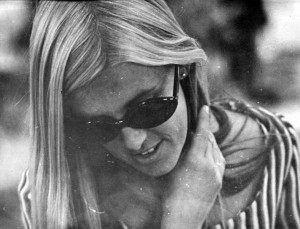Madelyn van der Hoogt, Teacher 1969-1974

I am currently looking at the time as it is being told by the clock that was in my classroom (204) at Tech. I love my memories of the teachers taking (not with authority) the clocks from their rooms when the building was being remodeled and they were getting rid of all the “old.” Not sure of the date. We did the clock exit, covering them up. Sue Babb and I were aided in carrying them out by a custodian, who would not have approved, but just thought we were taking away our teaching materials. At least that’s how I remember it.
I loved Tech because I loved the students and the other teachers. I loved the rallies on the steps at lunch and the days when there really was “student power.” It is incredible to think how students then chose their own classes and teachers by running to sign up with the teachers in the gym.
I would love to open the door to the teachers’ cafeteria and have lunch with Sue Babb, Jim LeyCuyer, and Ron Valentine, just one more time. I think the faculty was stellar; we cared about the kids. We did not have to endure standardized tests to prove our excellence. We barely had a curriculum, but I think we taught from the heart. It was a period in which many of the teachers and the students were very united. I was trying to make the classics seem very cool, but taught them alongside books like Native Son.
My favorite thing, though, was that the previous five years I had taught at Claremont Jr High. I would move up to teach the next grade every year, so some of the kids I had for all of their English classes in both junior and senior high school. In the turbulence of that period, I was kind of a constant and got to know them very, very well.
I was active in the anti-war protests in Berkeley at the time, but the war was not as big (in my memory) a deal at Tech as social issues were. I don’t remember the draft as something the kids worried about, but I could have been concerned about other things. I mostly worried about their futures vis-à-vis education.
My only contact with a student who served in Vietnam was one who wrote me years later to say that he spent his military service on a destroyer. He really wanted me to know how much he appreciated what I taught him. It was thrilling to hear this since teachers don’t often get feedback years later, but then he said: “You talked so fast that I was able to understand my sergeant who talked fast, too.” This wasn’t the compliment I had hoped for.
